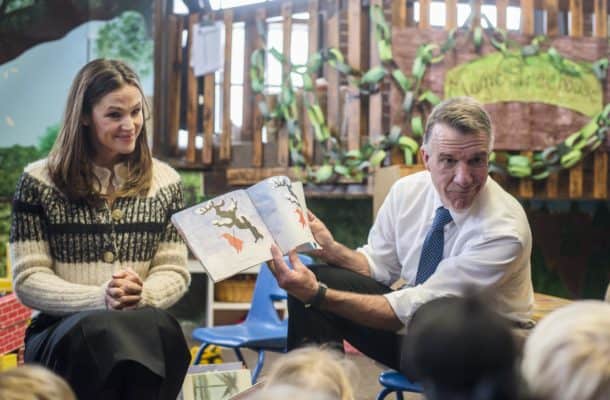By Erin Petenko and Lola Duffort

Gov. Phil Scott plans to spend about $12 million in federal relief funds to dramatically expand child care capacity for school-aged children, including establishing regional child care hubs for students on remote learning days.
The state estimates 10,300 students K-6 will need care while their parents work on days when schools are not offering in-person instruction. To meet demand, Scott administration officials announced they will relax regulations for in-home providers, streamline the process for those seeking to create new centers, and provide start-up grants for new regional child care hubs.
“We know we need more child care capacity. And we need it quickly,” Scott said at his twice-weekly press conference Tuesday.
It’s up to individual school districts to decide how to reopen schools this fall. A majority have opted for some form of hybrid learning, with a mix of in-person and remote instruction, according to Secretary of Education Dan French.
The state surveyed school districts last week, and 46 so far have responded that they are using a hybrid approach, French said. Three are fully remote. Districts choosing a hybrid option are not doing so in a uniform manner: the vast majority will offer two days of in-person learning and three days of remote instruction. A minority will offer four days of in-person learning and one day of remote learning.
With basically all school district reopening plans including some measure of instruction from home, child care has quickly emerged as a top concern for both working parents and teachers, many of whom will find themselves in the classroom on days when their own children are learning remotely.
The Scott administration’s plan would eliminate the restriction on in-home providers that prevents them from offering more than 4 hours of care per day to school-aged children. That measure alone should provide an extra 3,000 child care slots, according to Human Services Secretary Mike Smith.
An additional 7,000 children could be served at about 73 new child care hubs established across the state, Smith said. All school-aged children will be eligible for care.
“These hubs will be set up in workplaces, in school buildings, recreational buildings, municipal buildings and summer camp buildings that historically care for children,” Smith said.
Staffing the new hubs is a recognized issue. Smith said they may have to pay a premium to get counselors to the programs, including a possible signing bonus. They plan to have 10 counselors per hub with a site director.
Dr. Mark Levine, head of the Department of Health, also addressed the latest news about new Covid tests at the University of Vermont, Norwich University, and Vermont Technical College.
He said that while the positive tests could sound concerning, they are a sign that the system is working.
“We actually want to find these cases on campus, so we know who needs to stay inside and away from other people,” he said.
Levine said the state is doing well in contact tracing as it braces for a possible increase as students return to campus, although he said younger people tend to have more contacts because they are more social.
Also at the press conference, Scott provided an update on the state’s budget. He said he was not planning to increase taxes or cut essential services, but warned the state could face further fiscal problems.
“I don’t believe that’s the time to be asking for more from Vermonters, especially when we consider we haven’t yet felt the full magnitude of the pandemic,” he said. “Nor do we know the extent of the economic impacts, as well.”
He echoed Secretary of State Jim Condos’ concerns about the situation at the postal service, which has seen cuts to services under Postmaster General Louis DeJoy.
“They thought that we would be okay here, that we wouldn’t be impacted like other states, but I share the concern and I’m grateful that the Congress is going back into action,” he said. Congress is discussing legislation that would restore post office services to previous levels.



